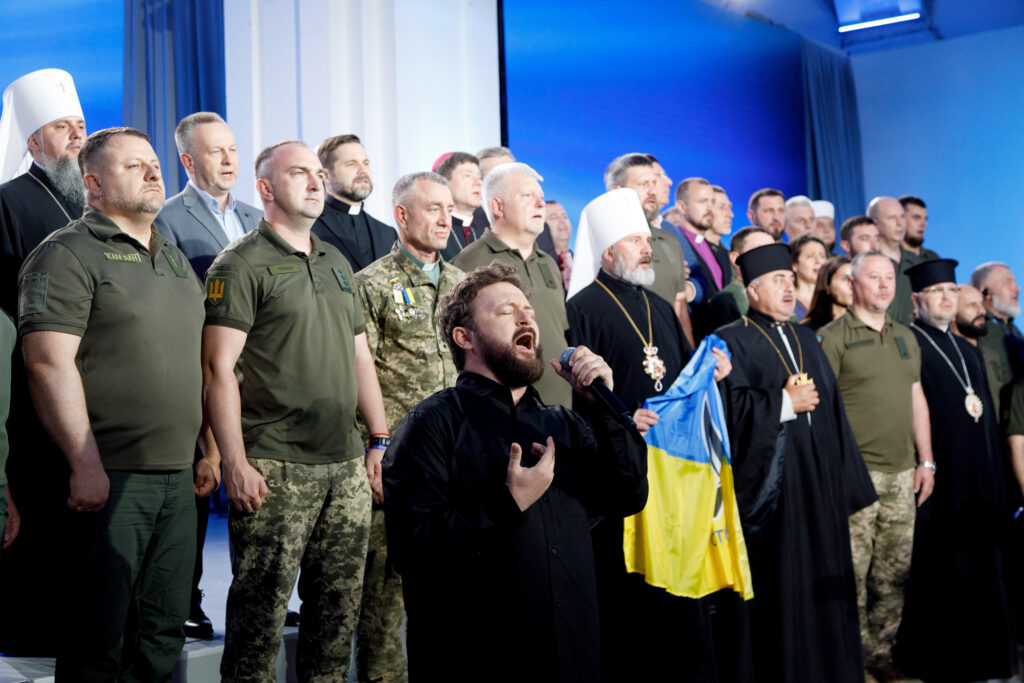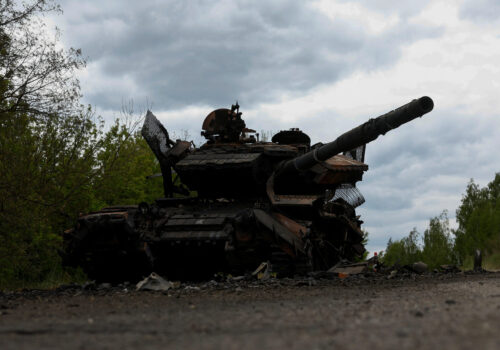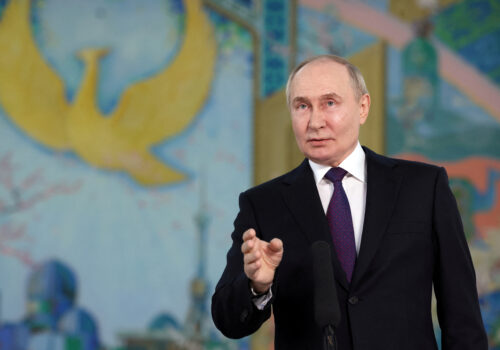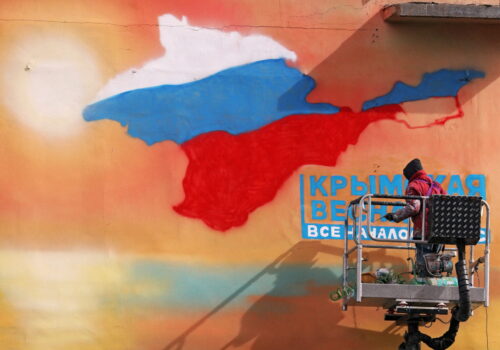On June 29, more than eight hundred participants from fifteen countries representing a dozen different religious denominations gathered in the historic heart of Kyiv for Ukraine’s annual National Prayer Breakfast. The day before the breakfast, two Ukrainian Greek Catholic priests, Father Ivan Levytsky and Father Bohdan Geleta, had been released from Russian captivity in a prisoner exchange brokered by the Vatican Diplomatic Corps. Ukrainian President Volodymyr Zelenskyy welcomed the priests back to Ukraine in a speech that drew tears.
I was honored to be seated close to the two freed holy men. Their features were tight and drawn from months of captivity and starvation, but this only served to accentuate the smiles on their faces from being able to once again worship without threat of Russian violence. Their strength and courage permeated the room like incense.
The Ukrainian National Prayer Breakfast, organized by Ukrainian evangelical Christian leader Pavlo Unguryan, first emerged from the regional prayer breakfast movement in Ukraine almost twenty years ago. The late June event was Ukraine’s tenth national prayer breakfast and notably, the first held under the auspices of the Office of the President. This presidential backing reflects the importance attached to religious freedom in Ukraine’s fight for national survival.
A former member of the Ukrainian Parliament from Black Sea port city Odesa, Ukrainian Prayer Breakfast organizer Unguryan has been building bridges between the American and Ukrainian evangelical communities for more than a decade. His relationships with key members of the US Congress reportedly helped provide the spiritual and emotional connection that convinced many Republicans to vote for a major new Ukraine aid package in April 2024. US officials were among the participants at this year’s breakfast in Kyiv, with a series of video addresses from members of Congress including Speaker Mike Johnson along with senators Richard Blumenthal and James Lankford.
The event was held in Kyiv’s Mystetskyi Arsenal, a cavernous former munitions plant located across the street from the one thousand year old Kyiv Pechersk Lavra monastery complex, one of the holiest sites in Orthodox Christianity. The list of attendees reflected the diversity of religious belief in today’s Ukraine. At one table close to mine, a Japanese Buddhist monk broke bread with Crimean Tatar Muslims during a service led by an evangelical Protestant, with prayers offered in Hebrew by Ukraine’s chief rabbi.
Stay updated
As the world watches the Russian invasion of Ukraine unfold, UkraineAlert delivers the best Atlantic Council expert insight and analysis on Ukraine twice a week directly to your inbox.
Ukraine’s National Prayer Breakfast represents an important reality check to Russian propaganda, which seeks to accuse the Ukrainian authorities of engaging in religious persecution. In fact, it is the Russian Orthodox Church itself that has declared a “Holy War” against Ukraine and the West. The head of the Russian Orthodox Church, Patriarch Kirill, has offered spiritual justification for the current invasion, and has said that Russians who die while fighting in Ukraine will have all their sins washed away.
Kirill has allies in today’s Ukraine. The Ukrainian Orthodox Church (UOC) is historically the local Ukrainian branch of the Russian Orthodox Church and remains the second largest Orthodox denomination in the country in terms of parishioners. Despite some effort to distance itself from the Kremlin following the onset of Russia’s full-scale invasion, the UOC remains closely associated with the Russian Orthodox Church and is staffed with clergy who have spent their entire careers reporting to Moscow. Around one hundred members of the UOC clergy are currently in prison or awaiting trial for a range of national security-related offenses including actively aiding the Russian military.
Recent research and polling data indicates that large numbers of former adherents are now leaving the UOC, while as many as eight-five percent of Ukrainians want their government to take action against the Russian-linked Church. However, while the Ukrainian authorities attempt to address this complex national security challenge, Kremlin-friendly public figures in the US such as Tucker Carlson, Candace Owen, and Marjorie Taylor Greene have accused Ukraine of persecuting Christians. A team of lobbyists, allegedly funded by a prominent pro-Kremlin Ukrainian oligarch, is currently canvassing Capitol Hill giving this message to members of Congress.
Eurasia Center events

Claims of religious persecution by the Ukrainian authorities are not only deliberately misleading; they also serve to obscure the very real crimes being committed against Ukraine’s Christian communities by Russian occupation forces. In areas of Ukraine that are currently under Kremlin control, virtually all churches other than the Russian Orthodox Church have been forced out. Even more alarmingly, a significant number of Christian community leaders have been abducted, imprisoned, tortured, or killed.
The details of Russia’s alleged crimes are often shocking. Baptist children’s pastor Azat Azatyan says Russians attached electrical wires to his genitals. In many cases, Russian Orthodox Church clergy are directly implicated. Evangelical pastor Viktor Cherniiavskyi claims to have been tortured with a taser while a Russian Orthodox priest tried to cast demons out of him. His alleged crime? Being an evangelical Christian.
International awareness of Russia’s hard line campaign against religious freedom in occupied regions of Ukraine is now finally growing. This is shaping attitudes among Christians toward the Russian invasion. While waves of Russian propaganda succeeded in sowing doubt among some Republicans during 2023, recent research has found that seventy percent of Republicans who identity as evangelical Christians are more likely to support aid to Ukraine when they learn of Russia’s oppressive policies against Christians in occupied Ukrainian regions.
The Kremlin is openly using religion to further the Russian war effort. The Russian Orthodox Church routinely portrays the invasion of Ukraine in religious terms, while members of the ROC clergy promote the war as a sacred mission. Throughout occupied Ukraine, all other Christian denominations are prevented from operating, with individual community leaders at risk of being detained or worse.
In stark contrast, the recent Ukrainian National Prayer Breakfast in Kyiv highlighted the Ukrainian government’s commitment to values of religious tolerance and diversity. This is the pluralistic Ukraine that millions of Ukrainians are now struggling to defend. They deserve the support of everyone who values freedom of religion.
Steven Moore is the Founder of the Ukraine Freedom Project.
Further reading
The views expressed in UkraineAlert are solely those of the authors and do not necessarily reflect the views of the Atlantic Council, its staff, or its supporters.

The Eurasia Center’s mission is to enhance transatlantic cooperation in promoting stability, democratic values and prosperity in Eurasia, from Eastern Europe and Turkey in the West to the Caucasus, Russia and Central Asia in the East.
Follow us on social media
and support our work
Image: National Prayer Breakfast held under the auspices of President of Ukraine Volodymyr Zelenskyy (Ukrinform/Cover Images via Reuters Connect) Featuring: Singer Mykhailo Khoma (front) performs Where: Kyiv, Ukraine When: 29 Jun 2024 Credit: Ukrinform/Cover Images **UK AND USA RIGHTS ONLY**




